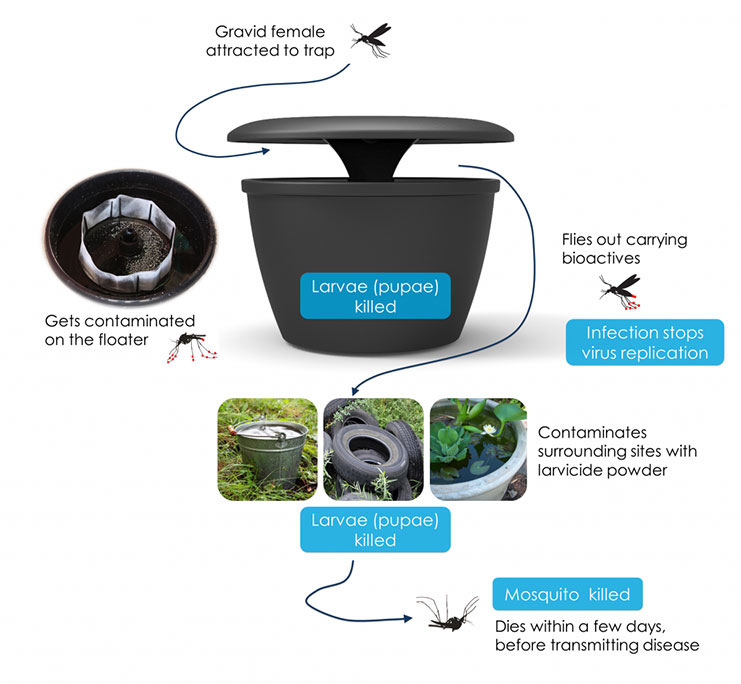THE recent rainy weather has resulted in an increase in the mosquito population and therefore the threat of the spread of vector bourne viruses such as Zika, chikungunya and dengue fever has heightened.
Director of Vector Control Services, Dr. Horace Cox told the Pepperpot Magazine that vector

Executive Raoul Persaud
borne diseases continue to be among the main areas of concern in the field of public health practice in Guyana.
“There is specific focus on the control of mosquitoes within Guyana as these are the main vectors in our setting. They are the agents responsible for the spread of diseases like malaria, dengue, chikungunya, Zika and Lymphatic filariasis,” he noted.
He explained that persons are encouraged to search for and destroy mosquito breeding sites around the home, school, church and place of business.
“ Individuals should get rid of mosquito breeding sites by looking for anything in which water can settle and either cover it, keep the area dry, clean it regularly, fill it with soil or sand, punch holes into it and recycle or properly dispose of it. If mesh is used to cover containers then the holes should be small enough so that mosquitoes cannot enter,” Dr. Cox emphasised
He explained that the fact that the wet season is upon us underscores the importance of reducing mosquito breeding sites and taking protective actions against the bite of mosquitoes. “All in all, everyone has a part to play in fighting the mosquito borne diseases within Guyana. Let’s all work towards making a difference.”
Dengue, Chikungunya and Zika virus are rapidly spreading in tropical regions throughout the world. Their vector, the Aedes mosquito, is difficult to control as it divides its eggs over various small and hard to find breeding sites and has become resistant to chemical insecticides.

Health officials recommended the In2Care Mosquito Trap that effectively attracts and kills Aedes mosquitoes with novel and green ingredients that target both larvae and adults. Trap activity is not limited to the trap itself, but extends to the surrounding area.
The In2Care Mosquito Trap was previously authorized to be sold to governments and pest control operators. However, authorization has now been given for it to be sold to the general public. The trap is produced by US-based distributor Univar.
Univar Account Executive for the Caribbean, Raoul Persaud in an interview with the Pepperpot Magazine said the In2Care device controls the Aedes aegypti mosquitoes by taking advantage of their behavior; luring them into the traps, contaminating them and letting them spread larvicide to other breeding sites. This enables control of these mosquitoes in small and hard to find breeding sites.
The Univar representative explained that the devices can be placed on the outside of homes, schools, hospitals, offices and other buildings and used year round to keep mosquito populations reduced with minimal effort.
In addition, Persaud explained that the In2Care Mosquito Trap is made of durable polyethylene components, and consists of a lid, central tube, click-on interface and reservoir. A floater moves along the central tube with the water level and serves as the landing/resting site for mosquitoes. Female mosquitoes are attracted to the trap by adding a tablet with attractive odours to the water.
The Univar rep further explained that the trap provides an attractive breeding site for egg-laying Aedes mosquitoes.
“When a female mosquito enters the trap to lay her eggs, she lands on the gauze on the floater. The gauze has two novel green biological agents – a biological fungus and a larvicide (Insect Growth Regulator). The female mosquito picks up both biological agents on her legs and body. The fungus eventually invades her body and kills her slowly over 8-10 days, thereby allowing her to spread the larvicide to other breeding sites that she visits,” he explained.
Further he said “in this way she kills her own offspring as well as the offspring of other mosquitoes. Eggs that are laid in the trap eventually hatch and become larvae but the larvicide present in the trap prevents the larvae from ever becoming adult mosquitoes that are capable of spreading disease. Each trap covers an area of 400 square meters.”
The Vector Control Unit (VCU) of the Ministry of Public Health is also working towards the establishment of an Entomology Unit as a means of enhancing its monitoring and management of mosquito borne-diseases. Funding for the Entomology Unit comes from the Inter-American Development Bank, through collaboration with Guyana Water Incorporated.












